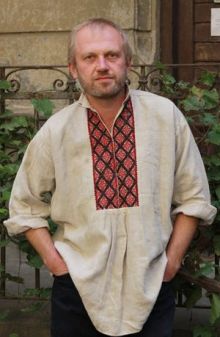Taras Prokhasko’s works are interesting, calm and somewhat meditative. He produces a similar impression in person. Prokhasko belongs to those writers whose new books are eagerly expected by many in Ukraine and abroad (incidentally, Prokhasko’s works have recently been translated into Russian, and seem quite popular). A new collection of the author’s works with the strange title botakIE has been published by the Lileia-NV Publishing House (Ivano-Frankivsk).
Mr. Prokhasko, tell us about your new book: what is it about, how was it written and why such a title?
“Most importantly, the book carries almost all I have written in a 10-year period. It even includes texts that had not been included to any other books before. In this format, when all of them are in one publication, all these stories acquire a certain quality. Thus, it becomes apparent that every writer writes only one book during his life. My book is about the way human existence intertwines with the being of place and time, how it grows from them and creates them.
“The title botakIE is an expression, used when one lacks the possibility to explain something. This is a kind of agreement that something is the way it can be and it should be this way.”
I have heard that the publication of the book and its promotional tour have a charity component.
“Charity means that the price of every book includes a share that is meant for the Ivano-Frankivsk-based orphanage ‘St. Nicholas Town.’ Technically, everything has been arranged so that the money will be immediately transferred to its account.”
You are often associated with “Carpathian literature” or the “Stanislav phenomenon.” What do you think about such a “geographic division” of literature?
“It is like categorizing plants. It corresponds to some reality, but the plants are not aware of this. Categorizing is needed for the simplification and streamlining of perception. It is very difficult to describe literature and not retell it. A certain method was created to do so. And ‘geographic division’ is one of the ways of realizing this.
“I have never taken interest in literature based on territorial attribute — Carpathian, Latin-American, Czech… I am interested in literature, which is so individual and local that it becomes universal. Therefore, surely, I will never be able to get rid of the Carpathians and Frankivsk-Stanyslaviv.”
Where do you like to travel, other than your native region?
“In terms of geography and history I am mostly interested in Europe. So I mostly like to travel in Europe, visit the utmost possible number of Europe’s ‘micro-versions,’ which are different and similar at the same time, from the Bay of Biscay to the Caucasus. In terms of aesthetics I like mountains and hills most of all. Yet the sea attracts me as thing that I lack in my native land, as a wild beyond. I am very much impressed by monuments. I like most to observe the details in the stylistics of life and memory revealed in it. I also like the gradual change of landscapes which is hard to be noticed.
“Besides, I like the state of traveling. I like it so much that it does not matter for me where it is taking place.”
What books are you reading at the moment?
“In reading I like several-week-long periods, marked by simultaneous reading and rereading of several books at a time. Namely this period has united the Czech reports of Mariusz Szczygiel, the underground textbook of the UPA Colonel Vasyl Andrusiak How to Win, my brother’s translation of The Notebooks of Malte Laurids Brigge by Rainer Maria Rilke, short stories by Zoran Feric, GULAG memoirs of Gustav Gerling-Grudzinsky The Other World and the collection of prose works by poet Oleh Lysheha. This is a nice period.”
When and how did you begin to write and take shape as a writer?
“At the age of 12-14 I understood that I perceived literature as an organic part of my life. And vice versa. As I live, I see it very well how this life can be described. This world perception has been and will remain a natural quality for me. It is so living that I am not speaking about real writing. I perceive what I have not written as ready literature.
“At the age of 25, I made the most important thing for me: I wrote several short stories Other Days of Anna and I saw that I wrote them the way I liked. This is what I had lacked among things I met as reader. Since that time I have not been merely a reader. I only write things I would like to add to the world of books.”







